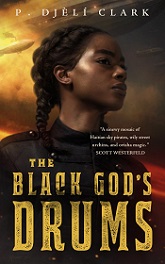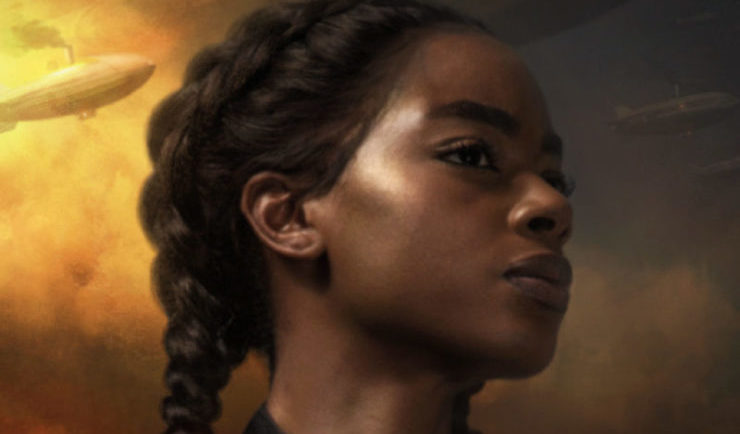It’s the 1880s and the Civil War has gone cold but racist rage still simmers. In this alternate history, California was settled by the Russians rather than Spain or Great Britain, the southwest belongs to New Mexico, and the Union and the Confederates are locked in a tense truce. New Orleans is a bastion of neutrality in a sea of slavery, an independent city-state where all are welcome to trade, even those with ill-intent. Men like the Rebels, a faction of the Confederates still fighting for secession.
On the streets of that fair city lives Creeper, a 13-year-old pickpocket who carries within her an ancient, unfathomable power: the goddess Oya. When Creeper happens upon a deal that could reignite the war, she decides to trade information for a chance to see the world. She strikes a deal with Ann-Marie, an airship captain from the Free Isles (Haiti and the decolonized Caribbean Islands), and the two hatch a plot to save the world. Nothing ever goes according to plan, though, and when humans play with power they cannot control it is the gods who must intervene. New Orleans hangs in the balance, torn between the racist white men willing to destroy the earth for their cause and the stubborn Black women who must risk their lives to stop them.
The Black God’s Drums is deceptively simple—rebels force a scientist to give them an extremely dangerous weapon and a pirate, a pickpocket, and a pair of powerful deities team up to stop them—but there’s a lot roiling under the surface. The plot moves quickly, perhaps too quickly for some readers who are used to having more room to explore. It’s not that Clark rushes the premise, but that he wastes no time in getting down to brass tacks. The descriptions are as dense and complex as a Louisiana swamp. Where most novellas offer a peek into a lush world through a spyglass, Clark presents a panorama in miniature.
Buy the Book


The Black God’s Drums
As a protagonist, you could hardly get any better than Creeper, a precocious teen who knows what she wants and how to get it, if not what she’ll do with it once she does. Co-star Ann-Marie is fierce and fearsome, like Beyoncé’s Lemonade brought to life. Oya says little, but her presence permeates every moment. She is everywhere, breathing between the lines until the story is as much hers as it is Creeper and Ann-Marie’s.
Clark wrote the dialogue partly in dialect, borrowing from Louisiana Creole, Caribbean English, Cajun, and Southern. It gives the reader a feel for the characters, the history of this alternate New World, and the culture of New Orleans. However, the dialect usage isn’t so excessive that it becomes impenetrable. Clark relies as much on sentence structure and word choice as he does on accents and pidgin spellings. The result is a set of voices so evocative you can practically hear them speak.
Winks to Black history and culture abound in the novella. Besides the Òrìṣà goddesses referenced, Ann-Marie St. Augustine is the captain of the airship Midnight Robber. She shares her name with a university town in Trinidad, her home country, as well as with Saint Augustine. He was one of the most influential men in the history of Christianity and was born in the Roman polity of Numidia, now northern Algeria, Libya, and Tunisia.
But perhaps the most important nod is Drapeto gas and zombies. Drapeto gas, a drug the plantation owners use on the enslaved that strips them of their willpower, is inspired by a thoroughly debunked mental disorder called drapetomania. The illness’ creator, Dr. Samuel Cartwright, believed it was the cause of enslaved Africans running away. If a slaveholders provided shelter and food for enslaved Africans, punished them harshly, reinforced the racist social hierarchy, and treated them like children, they would be, in his words, “spell-bound” and unable to run away.
In Haitian Vodou, a bokor (a kind of sorcerer or witch) could revive the recently dead and turn them not into brain-eating monsters but mindless creatures sometimes used for manual labor. Slavery was hell no matter where you lived, but for the 4 million sent to Caribbean sugar plantations it was a death sentence. The demand for sugar was so high and the work so arduous that many plantation owners found it cheaper to simply buy replacement slaves than provide adequate care and resources. The Haitian revolutionaries fought back against that abuse, and against all odds they won. And in a lot of ways, the rest of the Western world continues to punish them to this day for having the audacity to rise up. That theme is carried through in Drums in ways both subtle and obvious.
I read Drums not long after finishing Zora Neale Hurston’s Barracoon: The Story of the Last “Black Cargo,” and I can’t tell you how unprepared I was for how hard both stories hit me. Hurston and Clark were a one-two punch of the agony and vengeance of my ancestors and the way their hopes and fears are burned into my soul today. I’m still not over either book, and I don’t think I ever will be. Years down the line my mind will turn to Kossula and Creeper and I’ll be lost all over again.
Drums also feels reminiscent of Maurice Broaddus’ impressive novella Buffalo Soldier. While Buffalo Soldier is solidly science fiction, The Black God’s Drums plays in both the fantasy and sci-fi sandboxes. But both offer a thrilling steampunk take on a world where the colonized rose up against their masters and shattered their chains.
The first time I fell in love with P. Djèlí Clark’s The Black God’s Drums was when I saw the cover featuring the face of a determined, strong-willed Black girl. I fell in love again with the dedication: “To those who survived the crossing, and who carried their Black gods with them.” By the end of the first section, my love was uncontainable. I hope with all my heart and soul this isn’t the last time we’ll see Creeper and Ann-Marie, but if it is, what a ride.
The Black God’s Drums is available from Tor.com Publishing.
Alex Brown is a YA librarian by day, local historian by night, pop culture critic/reviewer by passion, and an ace/aro Black woman all the time. Keep up with her every move on Twitter, check out her endless barrage of cute rat pics on Instagram, or follow along with her reading adventures on her blog.










